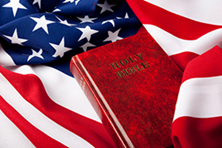ELCA Social Statement on Civic Life and Faith
Jun 9, 2024

The Sunday morning Adult Education class has been engaging in a lively discussion of the latest draft of a statement produced by the ELCA Task Force for Studies on Civic Life and Faith. The purpose of this study is to help faithful Lutherans discern their way through the challenges of living as committed Christians and engaged citizens of our American democracy.
This tension between American civic life and Christian faith has become more fraught with concern due to the rise in Evangelical circles of what has been termed “Christian Nationalism”, which promotes the beliefs that this country was founded as a specifically Christian nation (though they only seem to acknowledge particular expressions of Christianity as legitimate), that Christians should direct this country’s laws, structures and political policies, and that this “Christian America” enjoys special God-given blessing and privileges. While we can acknowledge that this movement is a response to genuine anxiety over the many changes in American culture, we must remain clear that it is contrary to both our constitutional history, as well as verging on idolatrous to the biblical witness.
The document can be found at elca.org/civicsandfaith. Here are some helpful excerpts:
Article 3: Both the biblical witness and human history make clear that humas beings are inherently social creatures and necessarily political beings. God’s intent is for human beings to use knowledge, wisdom and power to foster the common good.
Article 11: This church expects that each worshipping community will be engaged in active civic participation as one element of life in Christ’s church.
Article 14: The church’s prophetic presence in civic life calls for holding civic leaders accountable, taking constructive action and lifting up a vision for improved social well-being.
Article 19: Civic participation necessarily involves matters of government and political life. “Politics” in this statement is understood as the negotiation of how the benefits, burdens, rights and responsibilities of living in a society are shared.
Article 24: The Constitution explicitly supports religious neutrality and diversity. The Constitution’s choice was for religious self-determination. The later First Amendment to the Constitution expressed neutrality toward religion, thereby encouraging plurality of religion in society.
Article 47: The ELCA urges its members to renew their efforts toward robust civic participation, guided by concern for the well-being of all.